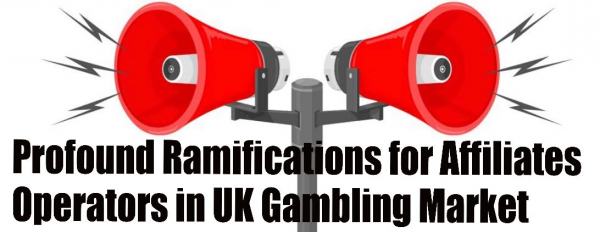Profound Ramifications for Affiliates, Operators in UK Gambling Market
ThePOGG has sounded the alarms over UKGC publishing a document called Alternative Dispute Resolution (ADR) in the gambling industry – Standards and Guidance for ADR providers. And yes it's as ominous as it sounds.
|
|
ThePOGG offered up a lengthy summary on the ramifications complete with scary subtitles like “Cannot withdraw = Cannot deposit – Impacts both players and operators”, “Suspicious Activity Reports – Impacts operators”, and “Compensation – Impacts players and operators”.
The later features this stipulation:
ADR providers should use their discretion to decide what to award, if compensation is deemed appropriate. The amount of money in dispute may be a factor to consider, though the impact on the consumer will usually outweigh this. The provider may also consider that a non-monetary award, such as an apology, is appropriate. ADR providers in the gambling industry may wish to agree an approach to compensation with each other.”
ThePOGG writes:
In our professional opinion the inclusion of this standard and any expectation for ADRs to manage ‘compensation’ type claims is a significant error in terms of the comparability with the courts the ADR system is intended to offer an alternative to, competency of ADRs to execute this standard, and due to the standard significantly skewing the system away from even-handedness to a stark and unquestionable bias to one party.
In terms of Limitation on investigative powers – Impacts players, ThePOGG made this observation:
The simple truth is that most players do not have the necessary mathematical understanding to verify a game fairness issue even where they have a credible data set. Where ADRs are limited from investigating claims of this nature the chances of them ever been confirmed or corrected are minimal.
This restriction clearly limits the actions the ADR can engage on behalf of the player. From a purely academic perspective this restriction likely re-balances the system in terms of impartiality but in terms of practical implications the player is unlikely to have access to the same resources and knowledge that the operator has to compile their own case so start at a significant disadvantage. Limiting an ADR’s right to investigate a player’s claim properly will likely result in fewer player favourable rulings.
And then there is the Responsible Gambling guideline, where the updated terms clearly impact players.
For years now the most vulnerable players have been left absolutely without recourse in case of any dispute other than to look to pursue the operator through the court system. Early edicts from the UKGC required ADRs to decline Responsible Gambling related complaints, meaning that those who have often already lost more than they can afford were faced with the daunting and potentially expensive process of pursuing legal action (where an address to serve the operator could even be located).
The ADR Guidance document changes this, defining specifically which Responsible Gambling complaints ADRs should review and which should be passed to the regulator:
"Permitted to gamble when self-excluded
A consumer may enter into a self-exclusion agreement with a gambling business, under which the consumer agrees to exclude themselves from gambling with the business and the business agrees to help prevent the consumer from accessing the gambling facilities. The ADR provider’s role does not include considering whether the business’s self-exclusion policy is effective – this is a requirement of the business’s licence and is a matter for us. However, we expect the provider to consider whether terms and conditions attached to any self-exclusion agreement are clear and fair in accordance with the requirements of consumer protection legislation, and whether it would be clear to the consumer that they were excluded from the channel, platform or premises from which they attempted to gamble. ADR providers should note that multi-operator self-exclusion schemes are in operation for both online and land-based gambling sectors. The gambling businesses do not run the multi-operator schemes, and therefore do not have responsibility for the terms and conditions or clarity of the schemes. As a result, complaints related to these schemes are a matter for us.”
- Chris Costigan, Gambling911.com Publisher















